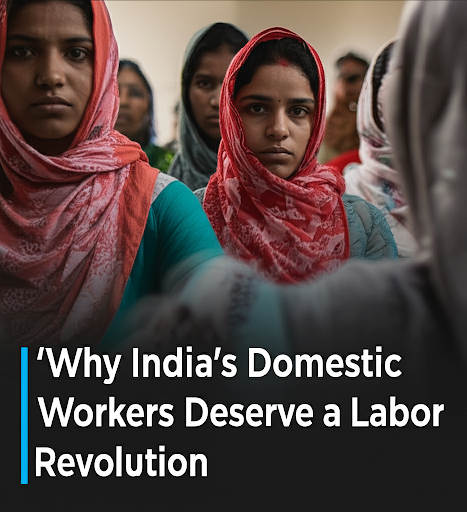Why India’s Domestic Workers Deserve a Labor Revolution

Introduction
They mop our floors, cook our meals, raise our children, and care for our elderly. And yet, in 2025, India’s domestic workers remain among the most exploited and invisible laborers in the country. With no formal contracts, negligible wages, and zero social security, millions of housekeepers, nannies, cooks, and caregivers operate in a system that routinely denies them basic human rights.
According to the International Labour Organization (ILO), India has over 50 million domestic workers, most of whom are women and girls from marginalized castes and tribal backgrounds. Despite their essential role in sustaining urban households, these workers are often subject to wage theft, abuse, and complete job insecurity. It's time to ask: why hasn't India formalized the rights of its domestic workforce?
The Legal Vacuum: Why Protections Don’t Exist
Unlike other labor categories, domestic work is excluded from major labor laws. While the Unorganized Workers’ Social Security Act (2008) exists on paper, enforcement remains poor. States like Kerala, Tamil Nadu, and Maharashtra have introduced welfare boards for domestic workers, but benefits rarely reach those in need.
No nationwide policy mandates a minimum wage, paid leave, or health insurance for domestic workers. Employment contracts are informal, often verbal, leaving workers vulnerable to sudden dismissal or exploitation.
"If I fall sick, I lose a day’s wage. There’s no sick leave," says Shanti Devi, a domestic worker in Delhi who works in four households daily.
In most cities, the lack of regulation allows employers to set arbitrary conditions, creating a gross power imbalance.
The Caste and Gender Equation
Domestic work in India is deeply entrenched in the caste system. Dalit and Adivasi women dominate this sector, as upper-caste women traditionally refuse such labor. The historical stigma of ‘impurity’ still influences how domestic workers are treated – from being denied the use of toilets to being served food in separate utensils.
Gender compounds the discrimination. These workers face sexual harassment, verbal abuse, and in many cases, live-in maids are subjected to forced labor conditions. Many report being locked inside homes, underpaid, or denied holidays.
The MeToo movement and various labor activism waves have largely bypassed this informal, invisible class of women.
The Pay Gap and Urban Exploitation
Most domestic workers earn less than Rs. 10,000/month, often spread across multiple homes. There are no standards for hourly or daily wages, and rates vary drastically based on location and negotiation.
In urban India, the rise of gated communities has only amplified control over workers’ access. Many societies now require biometric entries, restrict visitation hours, and maintain records on behavior, while failing to ensure any rights or protections.
"We are treated like security threats, not human beings," says Nargis, a part-time maid in Bengaluru.
The Rise of Domestic Worker Unions
In response to long-standing injustice, grassroots movements and unions are gaining momentum. Organizations like:
- SEWA (Self-Employed Women’s Association)
- National Domestic Workers Movement (NDWM)
- All India Domestic Workers Union
...are pushing for the inclusion of domestic workers under national labor law. Recent campaigns are demanding:
- Fixed working hours
- Paid leave and sick days
- Minimum wages across states
- Access to legal aid
- Maternity benefits
Some states have responded. For instance, Jharkhand became the first state to introduce a minimum wage notification for domestic workers in 2022. Yet, implementation lags.
International Standards: How India Compares
Globally, the ILO Convention 189 on Domestic Workers sets clear standards for decent work. Countries like South Africa, Uruguay, and the Philippines have ratified this convention and ensured protections such as social security, contracts, and complaint mechanisms.
India has not yet ratified ILO C189, citing challenges in enforcement and high informality. But critics argue that political will, not feasibility, is the real barrier.
Technology Platforms: Help or Hindrance?
Platforms like BookMyBai, Helper4U, and UrbanClap claim to professionalize the sector. While they offer standardization in hiring and wages, critics say these services cater mostly to urban elites and still lack worker-centric policies.
Workers on platforms often receive no benefits, and negative ratings can jeopardize their income. Some platforms are piloting insurance schemes, but coverage remains patchy.
COVID-19: A Wake-Up Call
The pandemic magnified every existing vulnerability. During lockdowns, most domestic workers lost jobs overnight, with no severance, savings, or safety net. Live-in workers faced confinement; part-time workers were abruptly dismissed.
Although some state governments offered one-time relief payments, the pandemic made it clear: India’s informal labor force is indispensable yet disposable.
What Needs to Happen Now
- National Legislation: India needs a comprehensive Domestic Workers Protection Bill with enforceable clauses.
- Standardized Contracts: Legally binding agreements must become mandatory for employment.
- Social Security Inclusion: Access to ESI, PF, and health insurance is non-negotiable.
- Awareness Campaigns: Educate employers and workers about mutual rights and responsibilities.
- Union Support: Government should fund and partner with domestic worker unions for grassroots enforcement.
Conclusion: Time to Acknowledge, Protect, and Empower
In 2025, India prides itself on being a digital superpower, a democracy, and an emerging global force. But our domestic workers still live in the shadows, carrying the weight of the economy on unrecognized shoulders.
It’s time for India to acknowledge their contributions, legislate their rights, and revolutionize how we treat those who serve us daily.
Call to Action
How can we build a fairer future for the hands that serve us daily?
Tag a union or advocate supporting domestic workers. Share this blog to raise awareness. Let’s stop the silence, and start a movement. #substack



